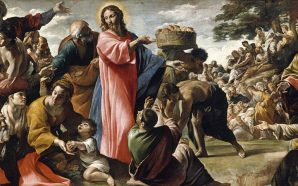Homily for the Solemnity of Christ the King
Ezekiel 34:11-12,15-17; Psalm 22; 1 Corinthians 15:20-26,28; Matthew 25:31-46
26th November 2023
On this feast of the Solemnity of Christ the King, our Australian bishops have published a letter to us all reflecting on last year’s plenary council in Sydney and this year’s session of the Synod in Rome. They have said: ‘Synodality means “walking together”. It means renewing structures and processes by which all the Baptised might participate in a shared mission to bring the Good News of the Lord to a society hungry for the Word of Life. This Mission is not just for some, but for all Christ’s Faithful.’[1] Archbishop Mark Coleridge is fond of saying that synodality is no longer just for bishops some of the time, but for bishops all of the time, and in fact, for all of us all of the time. Australia had the third largest national representation at the recent session of the synod. That was ten times the representation we could have expected in proportion to our numbers in the pews.
During the week, the Sense of the Faithful group sponsored a discussion evening on the recent synod process.[2] Bishop Shane McKinlay and Ms Susan Pascoe, synod participants, were invited speakers who shared their reflections on the experience, as did Brother Mark O’Connor FMS who was an observer in Rome.[3] All three were upbeat about the process, reporting that a month of deep listening to hundreds of people with diverse views was an exhausting but rewarding experience. Bishop McKinlay had a box seat at the synod as he was one of the people selected to work on the 40-page Synthesis Report. They worked around the clock producing three editions of a document which included a thousand amendments.
Listen at https://soundcloud.com/frank-brennan-6/homily-261123
Readers of the document who did not attend the synod could be forgiven for thinking it a bit bland and heavy, scrupulously avoiding any of the hot-button issues such as the priestly ordination of women. Though the document suggests the need for ongoing research about the question of a women’s diaconate, it makes no mention of the priestly ordination for women. At the discussion evening, I asked, ‘Was the question just not raised by anyone during the month of deep listening?’ When speaking of ordination, the document does state in a very gender specific fashion: ‘the contribution of families of origin, and the Christian community, within which a young man’s vocation is fostered, as well as that of other families that accompany his growth, cannot be underestimated.’[4]
Bishop McKinlay was unambiguous: women’s priestly ordination is not up for discussion; it is not a matter for discernment. The question is closed. That’s why there is absolutely no mention of it in the Synthesis Report. The only slight opening is to be found in Pope Francis’s prompt response to the query from five conservative cardinals led by Cardinal Burke in the lead up to the synod. These cardinals had asked ‘whether the teaching of St. John Paul II’s Apostolic Letter Ordinatio Sacerdotalis is still valid, which teaches as a truth to be held definitively the impossibility of conferring priestly ordination on women, so that this teaching is no longer subject to change or free discussion by pastors or theologians.’[5] Pope Francis had answered: ‘to be rigorous, let us recognize that a clear and authoritative doctrine on the exact nature of a “definitive statement” has not yet been fully developed. It is not a dogmatic definition, and yet it must be adhered to by all. No one can publicly contradict it and yet it can be a subject of study, as with the case of the validity of ordinations in the Anglican Communion.’[6]
In the year ahead, in preparation for the next phase of the synod, those of us who were not there in Rome are going to need a lot of encouragement that the Synthesis Report is sufficiently comprehensive to allow consideration of matters which have been agitated in our pews for decades past. During this last session in Rome, Susan Pascoe said: ‘If this is going to be a process where we really allow the Holy Spirit to speak from the grassroots, then we, we have to have a process of integrity. I think there’s also an awareness that we’re a privileged group here in Rome, and winning the hearts and minds of all that need to be involved — all the bishops, all the priests, all the religious, all the laypeople — it’s a massive exercise.’[7]
Archbishop Anthony Fisher was also a key player at this last phase of the synod. He was an elected member of the Synod’s Governing Council. He wrote to the people in his archdiocese this week sounding some clear warning notes. Like Bishop McKinlay and Susan Pascoe, he is all in favour of humble listening and prayerful discernment. But he warns: ‘Used as a weapon for forcing change of Church teaching or order, synodality would cease to be a true journeying with each other and with God.’ He acknowledges that the technique of ‘spiritual conversation’ adopted at the round tables at this synod ‘helps to turn down the temperature on controversial questions’ such as women’s ordination, but that ‘it doesn’t deliver theological clarity’. He quotes Fr Tony Lusvardi SJ, a professor of sacramental theology, who says that spiritual conversation is ‘not well-suited for careful or complex theological or practical reasoning. Doing that requires thinking that is critical, that weighs the pros and cons of what people say. It also requires a degree of objectivity that this method is not well-suited to provide. Sound theology needs always to ask the question, “That may sound good, but is it true?”’[8]
So we are all on notice that the next phase of the synod is not going to be as consensual and abstract as that which has just passed. Archbishop Fisher writes: ‘Deep listening to each other, expressing feelings, resonating in table groups, will not always help us find what is true and right. As one eminent theologian said to me: of the many synods he had attended, this one was the humanly best but theologically thinnest’. Fisher says, ‘A different method will surely be required next time around.’ ‘It is not the Synod’s job to change church teaching or order.’
Fisher, McKinlay and Pascoe are ad idem insisting on the need for patient listening and showing people the face of Christ. However I doubt that McKinlay and Pascoe would be as blunt as Fisher in then saying: ‘That does not mean abandoning what has been revealed by God or refitting our faith and morality for the current fashions. The Synod demonstrated that we can listen to the experiences of others with genuine Christian charity and without compromising truth, accompanying those struggling to accept the Church’s teaching or live it.’
For his part, Bishop McKinlay takes heart from the Synthesis Report that states: ‘We propose that initiatives enabling shared discernment on controversial doctrinal, pastoral and ethical issues should be developed, in the light of the Word of God, Church teaching, theological reflection and an appreciation of the synodal experience. This can be accomplished through in-depth discussions among experts with diverse skills and backgrounds….When appropriate it should also involve people directly affected by the matters under consideration. Such initiatives should be set in motion before the next Session of the Assembly.’[9]
With his characteristic flourish, Archbishop Fisher says: ‘Some have asked how we can be sure that we actually heard the Holy Spirit amidst all the verbiage.’
At the synod, Australian theologian Fr Orm Rush gave a splendid theological reflection on the Synthesis Report, drawing on the teachings of Vatican II and the insights of Joseph Ratzinger who had been a peritus at the council. Rush reminded the synod participants: ‘Vatican II…urged the church to be ever attentive to the movements of the revealing and saving God present and active in the flow of history, by attending to “the signs of the times” in the light of the living Gospel. Discernment of the signs of the times in the present seeks to determine what God is urging us to see—with the eyes of Jesus—in new times; but also urging us to be attentive to the traps—where we could be being drawn into ways of thinking that are not “of God”. These traps could lie in being anchored exclusively in the past, or exclusively in the present, or not being open to the future fulness of divine truth to which the Spirit of Truth is leading the church. Discerning the difference between opportunities and traps is the task of all the faithful—laity, bishops, and theologians.’[10]
On this Solemnity of Christ the King, our first reading from Ezekiel describes the Lord as a shepherd: ‘I am going to look after my flock myself and keep all of it in view.’ ‘I shall rescue them from wherever they have been scattered during the mist and darkness. I myself will pasture my sheep, I myself will show them where to rest – it is the Lord who speaks. I shall look for the lost one, bring back the stray, bandage the wounded and make the weak strong. I shall watch over the fat and healthy. I shall be a true shepherd to them.’
The Lord is our shepherd. Let’s hope and pray in the year ahead that we shall not want, as we walk together seeking to renew structures and processes in our Church. Together with our bishops like Fisher and McKinlay and with our lay leaders like Susan Pascoe, discerning the difference between opportunities and traps, let us pray:
The Lord is my shepherd; there is nothing I shall want.
The Lord is my shepherd;
there is nothing I shall want.
Fresh and green are the pastures
where he gives me repose.
The Lord is my shepherd; there is nothing I shall want.
Near restful waters he leads me,
to revive my drooping spirit.
He guides me along the right path;
he is true to his name.
The Lord is my shepherd; there is nothing I shall want.
You have prepared a banquet for me
in the sight of my foes.
My head you have anointed with oil;
my cup is overflowing.
The Lord is my shepherd; there is nothing I shall want.
Surely goodness and kindness shall follow me
all the days of my life.
In the Lord’s own house shall I dwell
for ever and ever.
The Lord is my shepherd; there is nothing I shall want.
Fr Frank Brennan SJ is the Rector of Newman College, Melbourne, and the former CEO of Catholic Social Services Australia (CSSA). Fr Frank’s latest book is An Indigenous Voice to Parliament: Considering a Constitutional Bridge, Garratt Publishing, 2023.
[1] See https://drive.google.com/file/d/1q5yDkcVIU7t67JmcEvU1UZuH7RhL025z/view
[2] See https://www.senseofthefaithful.org.au/about
[3] See https://catholicoutlook.org/ear-to-the-ground-letter-two-from-a-listening-and-global-synod/
[4] XVI Ordinary General Assembly of the Synod of Bishops, First Session, A Synodal Church in Mission: Synthesis Report, p. 22.
[5] See https://www.cardinalburke.com/images/backgroundimages/Dubia-2023luglio10-ENGLISH.pdf
[6] See https://www.cardinalburke.com/images/backgroundimages/Response-of-Pope-Francis-2023July11-ENGLISH.pdf
[7] See https://www.ncronline.org/vatican/vatican-news/exclusive-synod-reminder-very-acute-needs-across-world-cardinal-says
[8] See https://www.sydneycatholic.org/addresses-and-statements/2023/walking-together-in-communion-participation-and-mission-reflections-on-the-synod-on-synodality/
[9] XVI Ordinary General Assembly of the Synod of Bishops, First Session, A Synodal Church in Mission: Synthesis Report, pp. 30-31.
[10] See https://www.vaticannews.va/en/vatican-city/news/2023-10/synod-fr-ormon-rush-theological-input-on-synthesis-report-a.html








